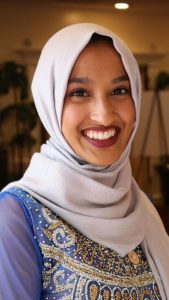Ayesha Nashurdeen talks about the Infant Mental Health-Developmental Practice (IMH-DP) Master’s program and how it has helped build self-confidence and self-awareness.

Ayesha Nashurdeen
My name is Ayesha Nashurdeen, and I grew up in Queens and Nassau County, New York, in a family of Indo-Guyanese Muslim immigrants. I received two B.A.s in Linguistics and Sociology from Stony Brook University, and worked throughout college as a Direct Support Professional and Assistant Coordinator of an autism social skills program in Long Island. Through the beginning of my academic and professional careers, my interest in child development and the social sciences blossomed. I began the M.S. program in Communication Science Disorders: Speech-Language Pathology at Adelphi University in Fall 2017, not knowing I would continue my journey by entering the M.S. in Infant Mental Health & Developmental Practice (IMH-DP) program a year later.
Throughout my personal, clinical, and work experience, I have come to understand the significance of considering the whole individual in my practice. For me, this means not just working with the symptoms of a case presented to me, but whatever other social-emotional, familial, and systematic factors/experiences may play a role in or impact a child’s development. My own development of a holistic practice grew particularly important to me as I began my clinical experience in the speech program working with a child with intense separation anxiety. Although my co-clinicians and I worked on improving the child’s comfort with the re-occurring separation throughout the semester, I could sense that we did not have the skillset to target the underlying challenge this child was facing in terms of attachment and close relationships. In other language therapy work with young children, I also encountered parents who were not encouraged or expected to be involved in their children’s learning. As a result, I was incredibly excited to pursue this program as a means to strengthen my own knowledge base and clinical skills to encourage parents’ involvement as they are the ones most present in their children’s lives outside of therapy.
Currently, I am in my second semester of the IMH-DP program. In addition to our classes on attachment and relational psychotherapy, this program has given me the opportunity to observe child development, learn to administer developmental screenings and assessments, and begin individual play therapy after receiving referrals at preschools and hospital well-visits. I am thoroughly looking forward to working with parent-child dyads under the guidance of our insightful supervisors and pioneering minds of the field as the program progresses. The program’s provision of numerous reflective sessions have also helped me to build self-confidence and self-awareness in terms of my own needs, self-care, and personal experiences that are naturally stirred up in this line of work. The staff and faculty are incredibly supportive in this regard and have definitely helped me to strengthen my professional persona as I begin to support other families.
After completing this M.S. degree program, I will be continuing with my final year in the speech pathology program. I would love to continue to work with parents and young children in a relationally-based context, and to bring this contextual perspective to the field of speech pathology. Additionally, I am interested in seeking out and collaborating with other professionals, such as Khalil Center in Manhattan, to bring these kinds of relational services to different populations. My areas of interest include families in other minority communities, families of children with developmental disorders, and families that may benefit from culturally and religiously integrative therapy.
For further information, please contact:
The Institute for Parenting
Linen Hall, Lower Level Room 8
p – 516.237.8513
e – theinstituteforparenting@adelphi.edu